9 small fashion brands to know and support this season
Looking to steer away from fast fashion? Lorelei Marfil highlights (and speaks to) nine small fashion labels to have on your radar
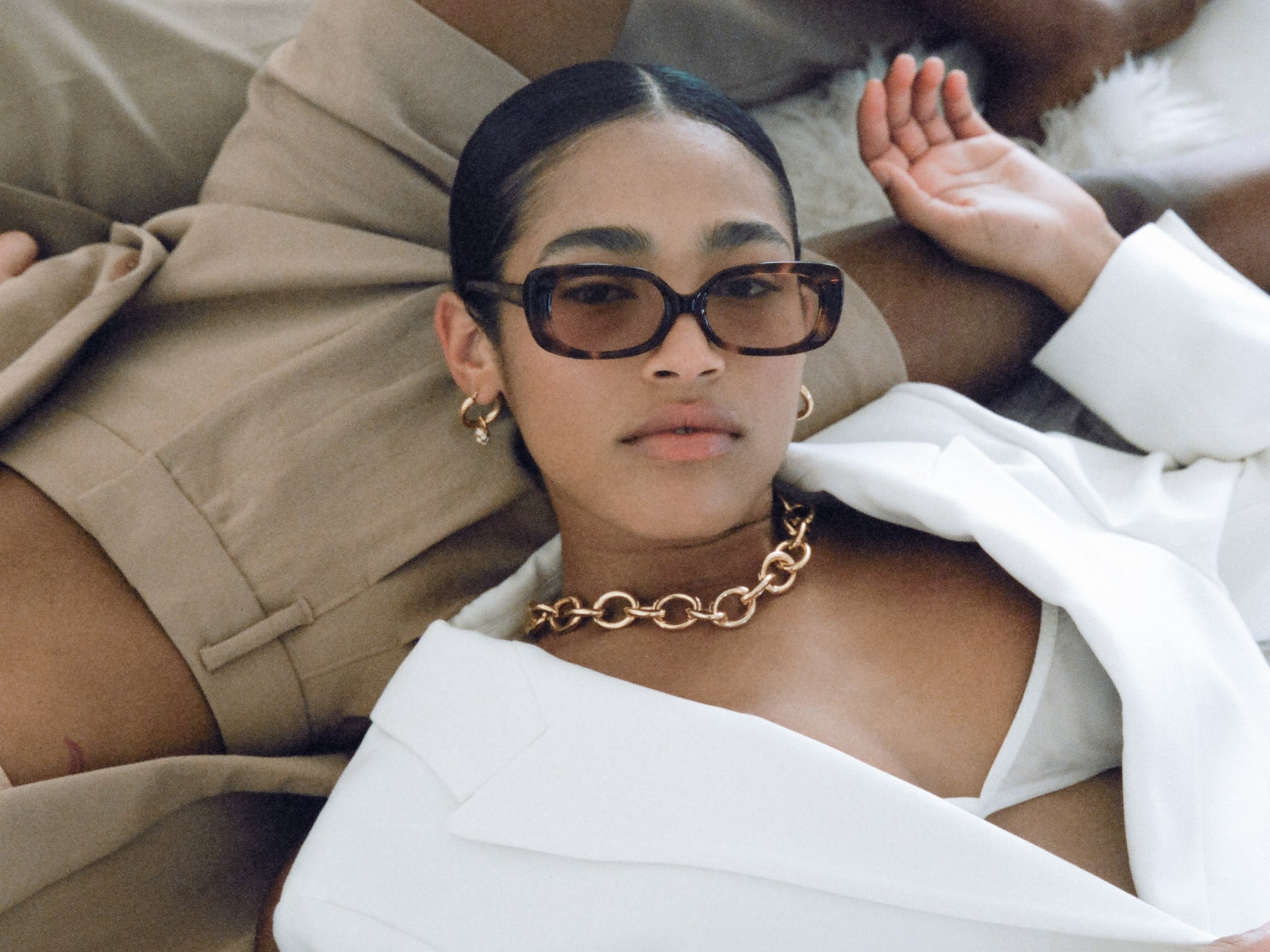
Your support helps us to tell the story
From reproductive rights to climate change to Big Tech, The Independent is on the ground when the story is developing. Whether it's investigating the financials of Elon Musk's pro-Trump PAC or producing our latest documentary, 'The A Word', which shines a light on the American women fighting for reproductive rights, we know how important it is to parse out the facts from the messaging.
At such a critical moment in US history, we need reporters on the ground. Your donation allows us to keep sending journalists to speak to both sides of the story.
The Independent is trusted by Americans across the entire political spectrum. And unlike many other quality news outlets, we choose not to lock Americans out of our reporting and analysis with paywalls. We believe quality journalism should be available to everyone, paid for by those who can afford it.
Your support makes all the difference.Shopping small has skyrocketed in popularity over the past decade, as Gen Z shuns fast fashion for smaller labels, both for ethical and environmental purposes.
To help point you in the right direction of where to shop, we’ve scoured the globe in search of new and noteworthy labels to know.
From discovering vintage-inspired hats from Australia to sustainable swimwear and womenswear from Sweden, here are the small fashion brands to have on your radar.
Lack of Color

Inspired by their love for vintage, Queensland couple Tess Corvaia and Robert Tilbury launched Lack of Color in 2011. Celebrity fans include Rihanna, Selena Gomez, Gigi Hadid, Kendall Jenner, and Hailey Bieber.
Crafted in 100 per cent Australian wool or natural wheat straw, the range is sold in Selfridges, Harvey Nichols, Harrods, Fenwick’s.
What inspired you to launch your label?
Tess Corvaia: Rob and I had an eclectic collection of vintage hats, some of which belonged to our grandparents and others that we’d picked up along the way at markets or thrift stores, and we just loved them. For us, the fascination grew from there. When we started LOC, we identified a huge gap in the market. There weren’t really any cool, affordable, fashionable hats — especially for a younger generation. We wanted to make hats fun, modern and wearable again while encouraging a new wave of creative ideas.
Why hats?
It seemed like there were a lot of other accessories brands and categories, but we felt hats were a very sleepy market that needed to be explored and reinvigorated.
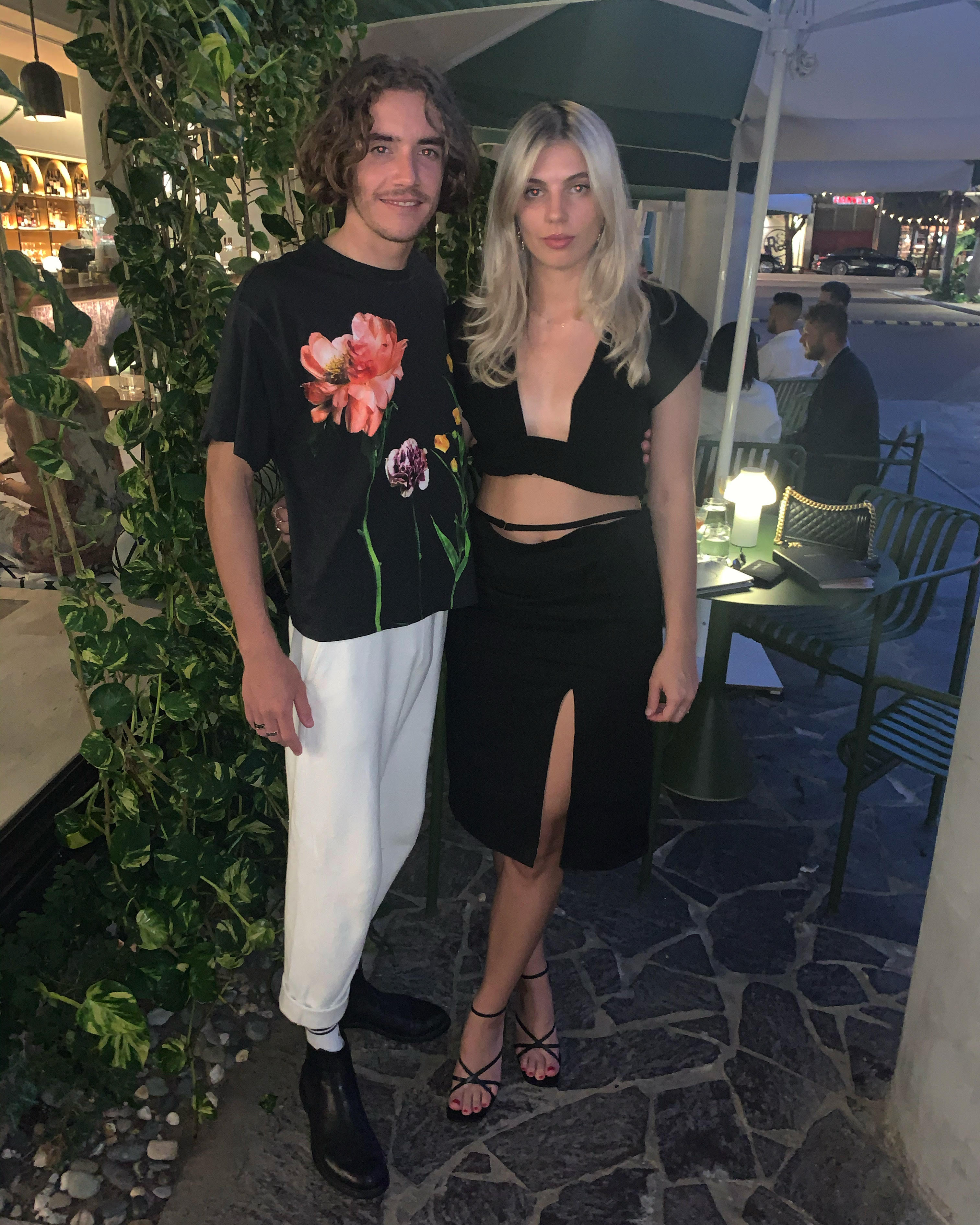
What is the brand ethos?
Create fun, desirable, and inclusive hat designs for anyone and everyone. Our goal has always been to enthuse and inspire our customer and community.
How would you describe your signature aesthetic?
A little sun dress, slides, sunglasses and a vintage Chanel bag. Always vintage.
What was the inspiration this season?
Sun to Sea was born from this idea of spontaneous moments infused with imagination. A longing for an escape into the sunrise, the deep blue and beyond. We were inspired by the bright pops of colour you see across coastal towns like Acapulco in Mexico (where the campaign was shot). We wanted to use bright blues and greens and bring to life the essence of the brand — creating bright and bold hats (while giving a cheeky nod to our name, Lack of Color).
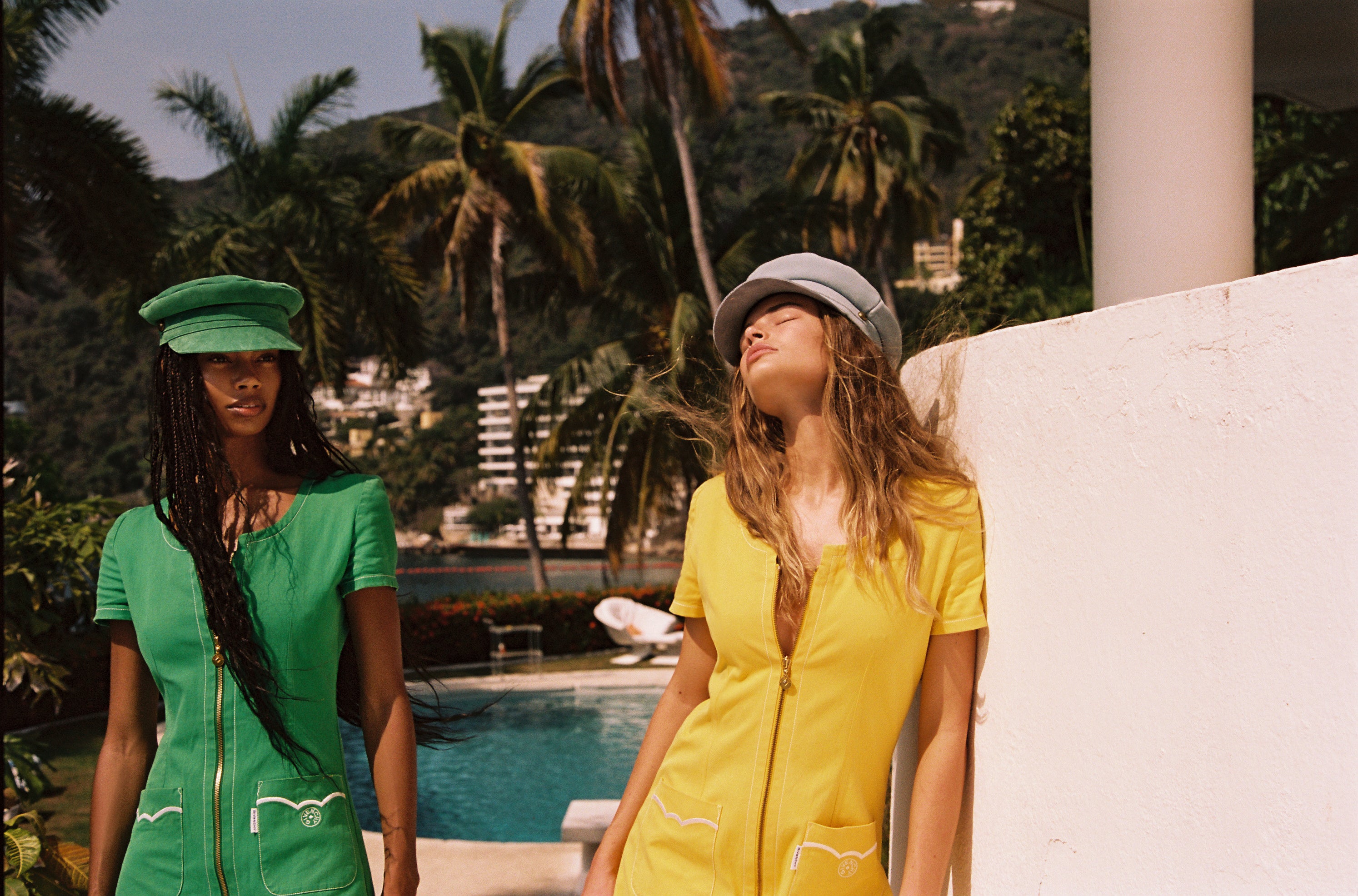
Who is your customer?
Anyone and everyone.
What are your plans for the label?
Worldwide expansion — we have a vision to be the leading hat brand in the world.
Velvet Canyon

Launched in 2018 by sisters Bec Nolan and Cassy Moase, and photographer Ali Mitton, accessory brand Velvet Canyon takes cue from the vintage aesthetics of the Sixties and Seventies.
Each pair of sunglasses is ethically crafted with recyclable materials including cotton, cellulose and wood pulp. The brand is sold at NET-A-PORTER and End UK.
What inspired you to launch your label?
Bec Nolan: I was styling photoshoots and couldn’t find the sunglasses I wanted. The vintage pairs were not quite right — right shape, wrong colour, right colour frame but what’s with those lenses… and the new styles just weren’t what I was looking for. Cass and I had been talking about starting a project for a while, and Ali was so excited about the idea when I told her (and such a talented photographer) that it seemed natural we should all do it together.
Why sunglasses?
I love the fact that with eyewear we are limited only by our preferences — not our clothing size.
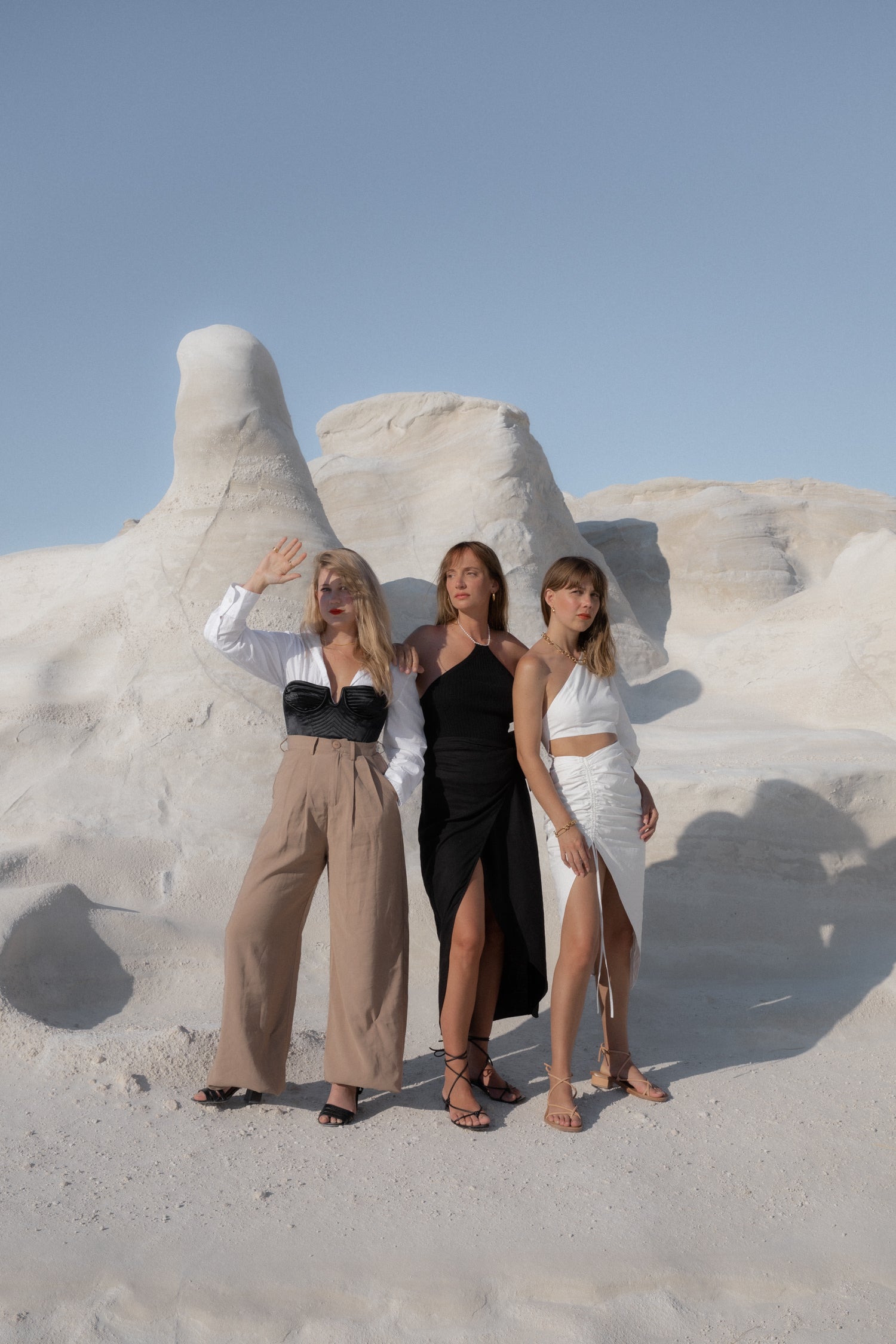
What is the brand ethos?
We aim to be as responsible as we can in all ways — environmentally and socially. Our eyewear is low-impact in both the materials and production process. We support asylum seekers with per cent of our online sales donated to the ASRC, we are committed to never using animal products, and to value all lives along our production chain and in our business, which of course extends to our customers.
How would you describe your signature aesthetic?
Elevated, timeless and minimal with dreamy 1970s undertones.
What was the inspiration this season?
My style icons are “older” Parisian women — the slightly eccentric but oh-so-classy women with their grey hair in bobs and their colourful clothing. I’m always checking them out on the street. I imagine what their life has been like, growing up in Paris in the 1960s and 1970s, imagining them as artists and socialites.

Who is your customer?
Anyone who loves our sunnies — we don’t discriminate!
What are your plans for the label?
To continue to become more and more sustainable (we’re excited to be trialling new materials!) and continue to make beautiful eyewear for everyone.
Feben

Launched in 2020, Feben Vemmendy has made a name for herself with her surrealistic aesthetic. The Central Saint Martins alum is an Isabella Blow scholar, and is a part of the British Fashion Council’s New Gen lineup.
Born in Pyongyang, North Korea and raised in Sweden by her Ethiopian mother, the London-based designer’s fans include Beyonce, Erykah Badu and Janelle Monáe. Her range is sold at Browns, Farfetch and Ssense.
Why fashion?
Fashion has become a tool for me to express myself, my work is very personal.
What is the brand ethos?
Community.
How would you describe your signature aesthetic?
Anything in texture but also our Twist that comes in different styles.
What was the inspiration this season?
The capsule collection for Browns was an exploration of our collection X-pression.
Who is your customer?
Anyone who is drawn to textures, colour and an eclectic look.
What are your plans for the label?
The brand is very young but I’m looking forward to seeing it grow.
Yueqi Qi
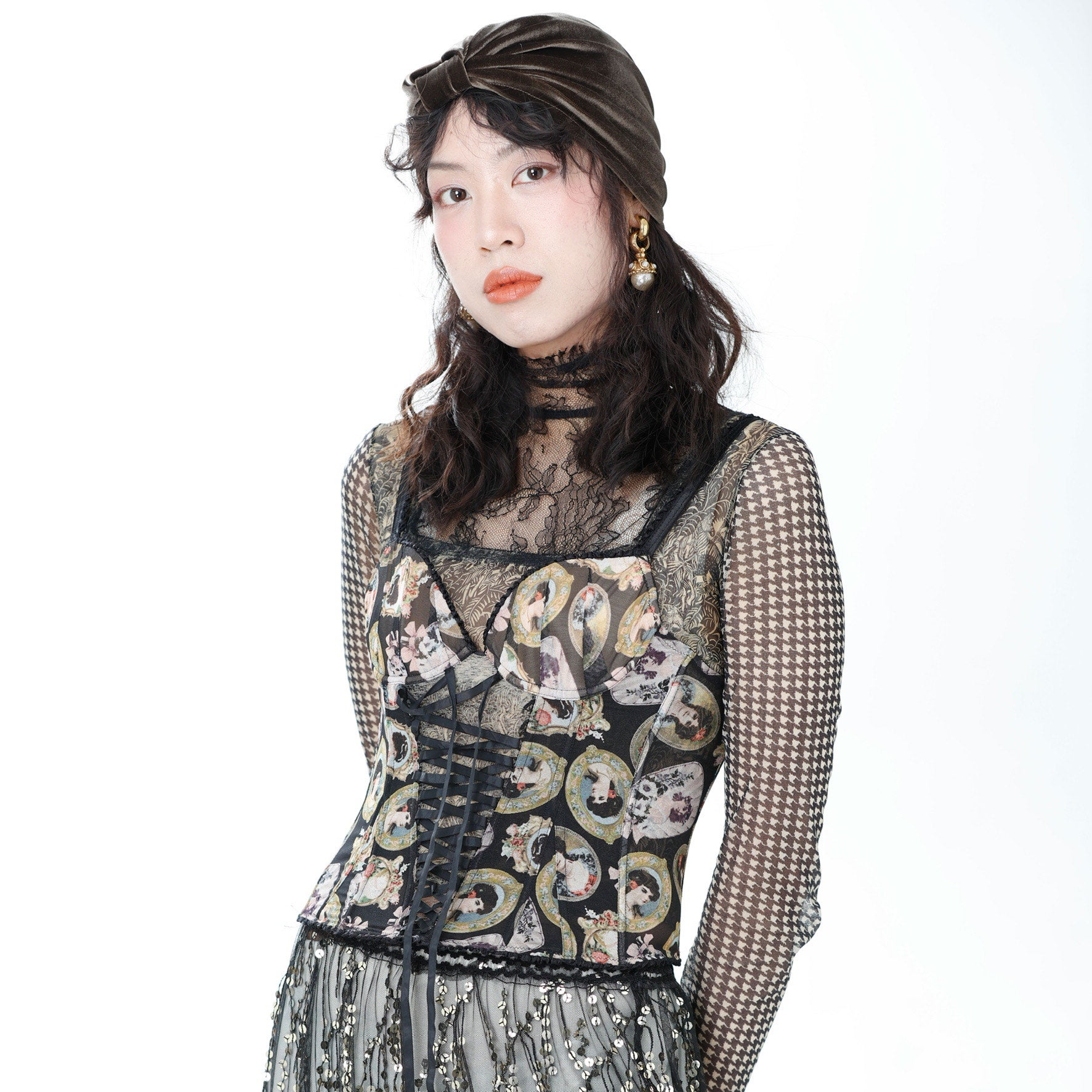
Inspired by her Chinese heritage and history, Yueqi Qi launched her eponymous line in 2019.
The Central Saint Martins graduate has worked at the Chanel embroidery atelier, and she also teamed up with Gucci on GUCCIFest and VAULT Gucci. Her collection is sold at Browns and Farfetch.
Why fashion?
I knew I wanted to have my own label when I was 10 years old. After graduating from Central Saint Martins, I had to decide between applying for work at a Parisian fashion house or starting my own label. Obtaining a work visa in the EU can be quite challenging, so I decided the time was right to start my own label.
I was always attracted to fashion as a medium of storytelling. Growing up in Guangzhou, fashion was both an escape from the industrial landscape and a means to preserve and share transgenerational stories. I have always been interested in the shared space where escapism and realism can exist.
What is the brand ethos?
The brand ethos is a celebration for the modern woman. The brand focuses on narrative-oriented collections with emphasis on intricate bead weaving and nouveau couture.
How would you describe your signature aesthetic?
My aesthetic is anti-tribal femme deluxe.
What was the inspiration this season?
The inspiration for this season, Growing Flowers by Candlelight, was the theme of revenge as misguided love. I drew inspiration from Agatha Christie and Raymond Chandler novels to explore the stoicism, beauty, and danger of femininity. With laser cut PTE, I mutated the Chinese character for “love”. The recurring black lilies (flower of revenge) embody vulnerability as strength and stillness with action. I used masking to explore anonymity and culpability in relation to revenge. When everyone is guilty, nobody is guilty.
Who is your customer?
The Yueqi Qi customer is a young woman who is blossoming into womanhood with grace and self-assuredness. She is strong, independent, delicate, and equanimous.
What are your plans for the label?
My plan for the label is to build a solid foundation, a strong team, and to not take things too seriously.
Oceanus

With a focus on sustainability, Ocenus’s swimsuits and bikinis are made from recycled eco-friendly materials such as Econyl with bodegradable embellishments.
Launched by Hannah Attalah, the creative director and founder is of Irish and Lebanese descent and was born and raised in North West London.
She studied fashion and business with a focus on sustainability at the University of Brighton. Stocklists include Browns, Farfetch and Harvey Nichols.
What inspired you to launch your label?
I saw a gap in the market for luxury swim that was almost like RTW. I had a clear vision for what I wanted Oceanus to be and knew that women would love the designs and techniques that we used. No one out there was using the materials and beading techniques that we used for swimwear. The timing felt right, and Oceanus was born.
Why fashion?
I couldn’t see myself doing anything else honestly.
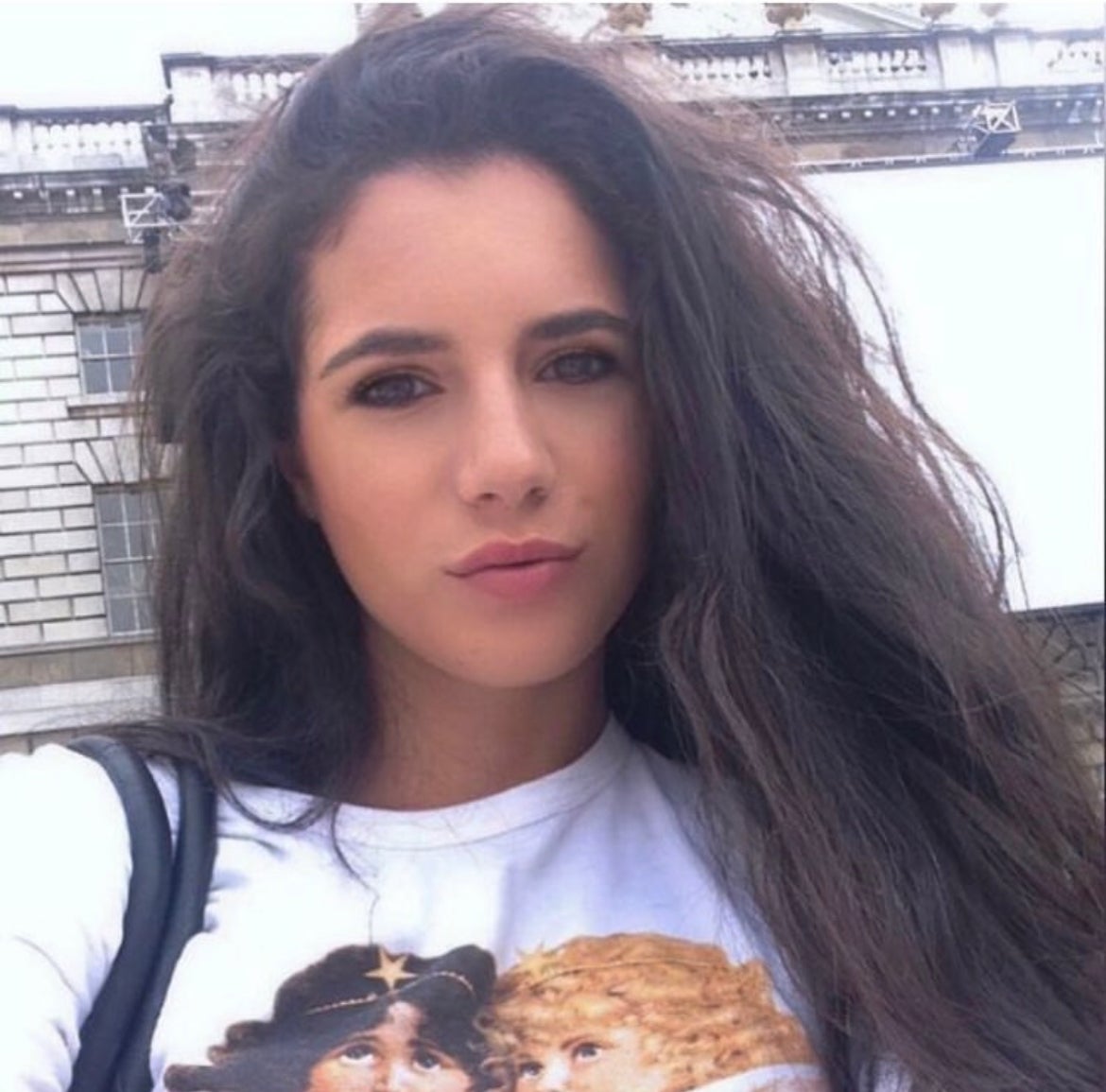
What is the brand ethos and how would you describe your signature aesthetic?
Oceanus is on a mission to redefine swimwear and empower women. Designed with the intention of turning heads, each piece in the collection evokes a sense of self-expression to help women stand out and feel powerful. The brand exudes confidence through its unique textures without compromising on sustainability. Each piece is made from recycled, eco-friendly materials and hand embroidered with Swarovski crystals. Oceanus reflects the confident attitude of 1980s glamour evening wear. This is a constant reference point for the brand and you will see this throughout the collections.
Who is your customer?
We have a broad customer base because we strive to make sure everyone feels amazing in our pieces. That’s really important to us.
What are your plans for the label?
We’ve launched a new RTW collection, jewellery and also a mini collection for kids. We see ourselves as a lifestyle brand so we are always looking into exciting additions to add each season while maintaining our brand DNA.
Jade Cropper

An advocate of sustainability, Jade Cropper is known for her sexy asymmetrical designs.
The Stockholm-based designer studied fashion design at Beckmans College of Design, and launched her label in 2020.
Her pieces have been worn by the likes of Kim Kardashian, Kylie Jenner and Julia Fox. The range is sold at Browns.
What inspired you to launch your label?
I saw a great demand on my pieces so it felt natural to start my own label.
Why fashion?
I have always loved and felt a hunger for being creative but it wasn’t until I started making clothes that I felt at home and a joy I never experienced before.
What is the brand ethos?
I want to reinforce and explore what fashion can make you feel about identity. With the aim of strengthening self-confidence. This in combination with sustainability in all steps from design process to materials and production.
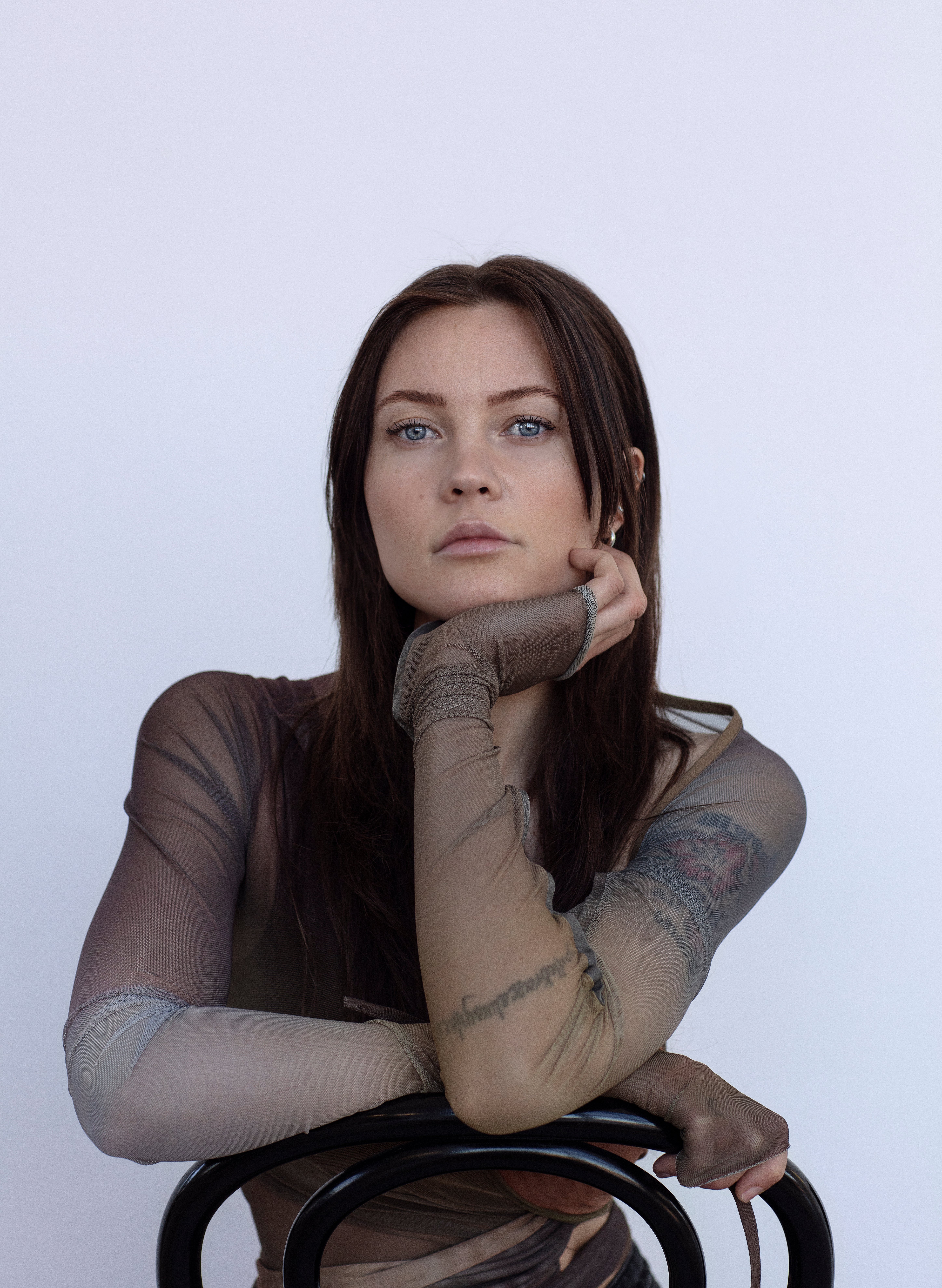
How would you describe your signature aesthetic?
Asymmetry, imperfection, feminine and empowering.
What was the inspiration this season?
My grandmother is a big inspiration to me, who is with me in everything I do. I want those who wear Jade Cropper to feel comfortable in themselves, strong and independent, just as she was.
I’m quite an introverted person. The clothes that I make express another version of myself, inspired by the way that my grandmother chose to live her life. She was an extraordinary individual that lived her life exactly how she wanted. She dared to be that “extra”.
I was also inspired by a very solution-orientated approach. Most of the garments in my collections also allow for changes in appearance and function using simple means like draping and jewellery.
Who is your customer?
In my mind I am designing for the person my grandmother was. Empowering, confident, and unafraid to stand out. I also think I am designing for everyone, I want you to feel empowered and cool when you wear my clothes.
What are your plans for the label?
I will continue to develop sustainable methods to be able to grow and scale up.
Mirror Palais

Mirror Palais is a sustainable label founded by former stylist Marcelo Gaia in 2019. Born and raised in Queens, New York City, Gaia studied design in a two-year program but honed his skills working for 10 years as a styling assistant.
The brand which honours the female form, takes cue from Gaia’s Brazilian heritage and it is sold in Browns, Selfridges and Ssense. Known for its signature high cut bikinis, his range has been worn by Emily Ratajkowski, Kendall Jenner, Kylie Jenner, Bella Hadid, and Dua Lipa.
What inspired you to launch your label?
I wanted to create something of value that allowed me to continue to tell stories the way styling did, but with something more tangible.
Why fashion?
I grew up drawing girls in dresses. When I was in middle school I switched from catholic school to public school, so that was my first experience where I felt I could express myself through the way I dress. It felt really good to put outfits together and see the way people would react to them, and I loved the attention.
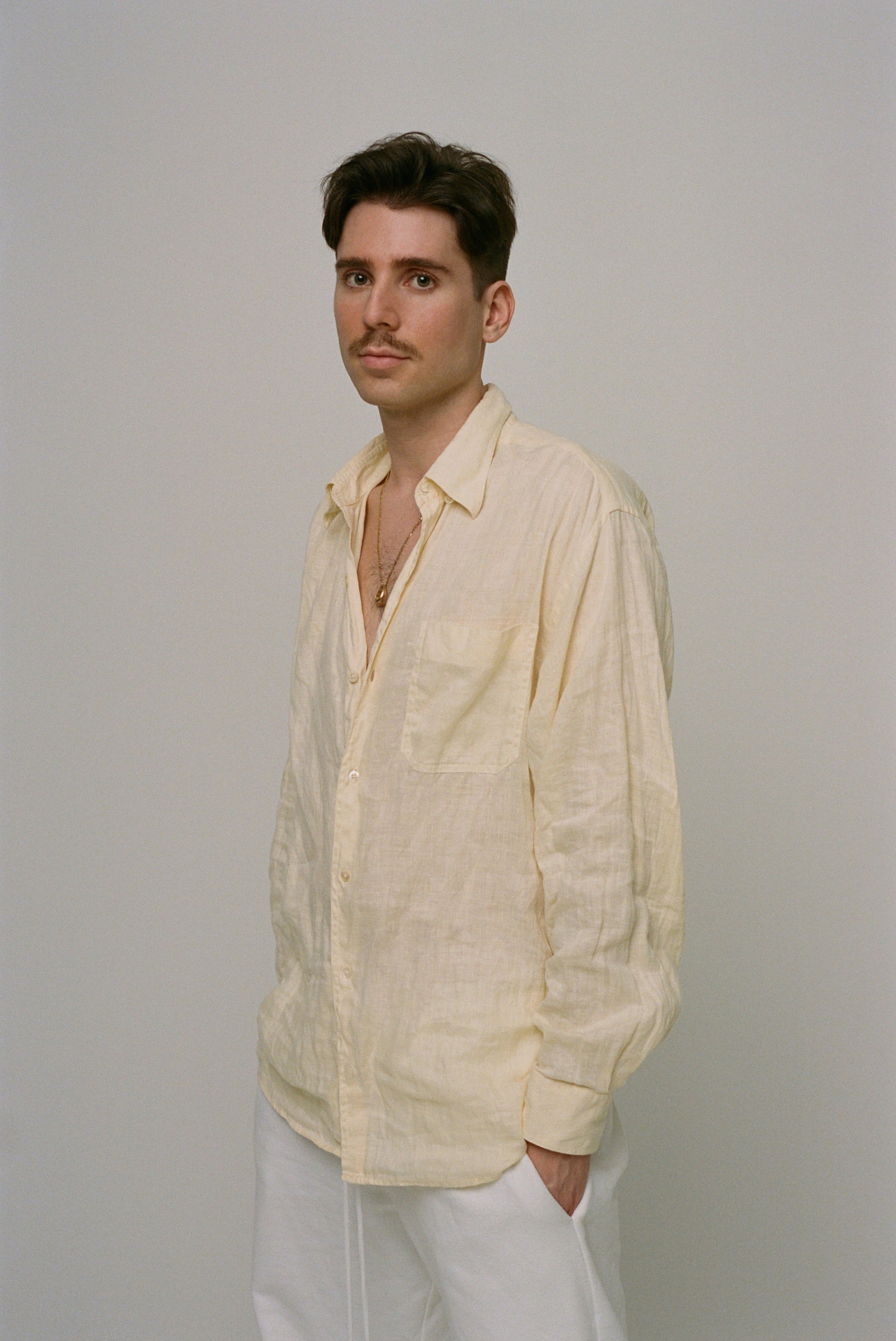
What is the brand ethos?
Create opportunities for our customers to shine without compromising who they are by keeping the style classic and flattering but never boring. To create an ethical company that people feel happy to be a part of and that encourages each member to live their life to the fullest.
How would you describe your signature aesthetic?
Romantic, nostalgic, and delicate while simultaneously bold.
What was the inspiration this season?
I was inspired by latin romance by films such as Gilda, Gabriella, and My Fair Lady which centre on complex and compelling female leads in timeless costumes. We wanted to create a more neutral palette which lends itself to the idea of multiwear, which is increasingly important to us as we create more collections that each piece can be incorporated into the wardrobe in many ways to extend their lifetime as a better investment for living sustainably.
Who is your customer?
Our customers range from the 16-year-old wearing the fairy dress to her junior prom, to the more mature woman who does not feel limited by her age to express herself or show off her body.
What are your plans for the label?
To show during New York Fashion Week and to expand our categories, maybe even menswear.
Tove Studio
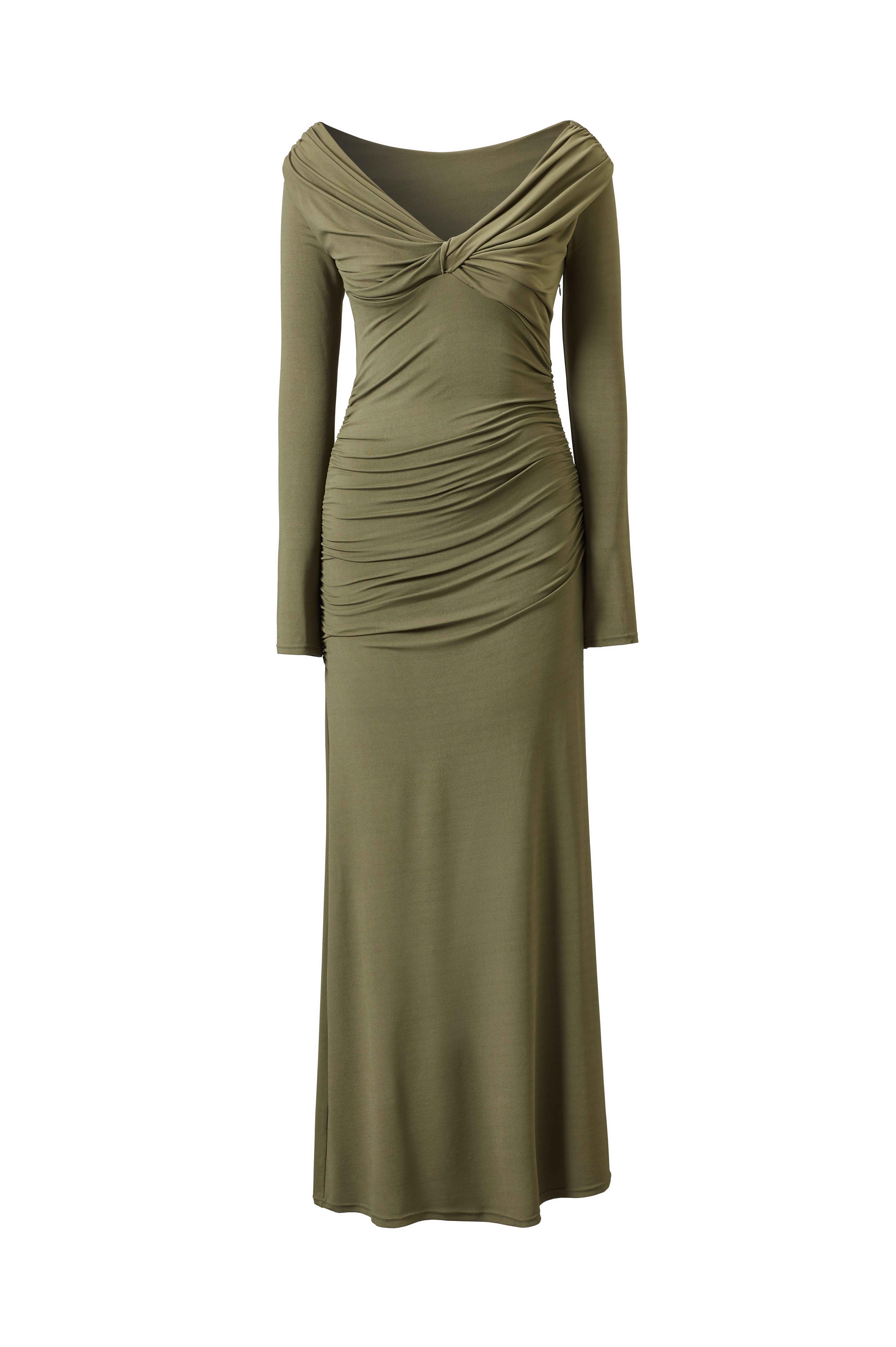
Launched in 2019, by London-based designers Camille Perry and Holly Wright, Tove Studio is known for its minimalist and refined aesthetic.
The contemporary label focuses on sustainability and employs natural recyclable and organic fabrics. Stockists include Browns, NET-A-PORTER and Selfridges.
What inspired you to launch your label?
Holly Wright: We had recognised that there was a disparity between contemporary and luxury and an opportunity for a modern, timeless, and feminine womenswear brand. The contemporary market was oversaturated with trend-driven brands that lacked attention to construction and quality fabrics. We wanted to propose an answer to this void by creating a modern brand that focuses on the fit, luxury fabrics, and timeless design, with an attainable pricing architecture that reflects the care taken with each piece.
Camille Perry: Our collective vision was to create a brand whose collections centred on signature sustainable pieces. Impeccably executed, but versatile and that could transition easily between occasions, day-to-evening, and work-to-family. Pieces that are beautiful enough to make a statement, whilst never overpowering the wearer. Our collections feature refined paired back styling, luxurious fabrics, with a focus on true quality. We felt we couldn’t find a brand that subscribed to this ethos, so were compelled to create it.
Why fashion?
HW: Collectively we have over three decades of experience working within the fashion industry. Our respective backgrounds are design and buying. My last position was as Head of Design and Camille’s as Head of Buying. We have seen the industry evolve so much throughout this time and wanted to pool our knowledge to create a new point of view. Both for the time in which we live now and for the future.
CP: We are fortunate enough to have a symbiotic working relationship having worked together for such a long length of time. Our collective vision is united, both in terms of our aesthetic and our sentiment regarding sustainability. It is this unwavering vision that helps to shape both the outlook for the collection and our brand.
What is the brand ethos?
HW: The philosophy of our brand is centred around the idea of real women designing for women, representing a vision of how we want to dress today. The creative process always begins with our TOVE woman. We share an affinity with her and the world that she moves in as it is similar to our own. Often she is a working mother balancing the demands of career, social life and family. We always consider where she is and how she is moving through life.
CP: Every TOVE piece is underwritten by an appreciation of the personal style of our woman and how each piece might be worn, layered and utilised. We adopt a seasonless approach. Pieces feel relevant yet have a timeless quality. The collections are always an evolution of the one before and with this approach our woman can wear signature pieces for years to come. Longevity and versatility are the cornerstones of the brand.
CP: With regards to sustainability we feel passionately that a brand created at this time must consider the impact it has on the planet. We simply cannot continue operating the way we used to, on so many levels – wasteful production cycle, the excessive mindset… The fabrics we work with when designing the collection are chosen due to their sustainable nature. Our signature organic cotton and silk are our signature fabrics chosen not only for their beauty and timelessness, but also due to the fact that they will last a lifetime, after which they will degrade naturally. We source fabrics from our Italian mills that are FSC approved, recycled and recyclable.
HW: Small-batch production helps us to maintain the levels of craft and consideration with every piece that we make. It also means that our production is mindful of waste. If a style sells well and sells out quickly, we find a way to reimagine it for our customer in our new collection. It means that our production can be mindful of waste.
How would you describe your signature aesthetic?
HW: Refined, modern, considered and feminine.
CP: Minimal and timeless with subtle ease and elegance.
What was the inspiration this season?
CP: Our inspiration is rarely drawn from academic sources. The focus always begins with the TOVE woman. We consider how she is moving through life, how she feels and where she is going.
HW: This season in particular our focus continues to be on a renewed joy and optimism. This is reflected in the fluidity in the silhouettes in the collection and the colour palette.
What are your plans for the label?
CP: We are very ambitious and have so many ideas, but everything we do has to be intentional. Such a thoughtful approach resonates with our customers as well. This year centres around a more physical presence with our first runway show.
Abaga Velli
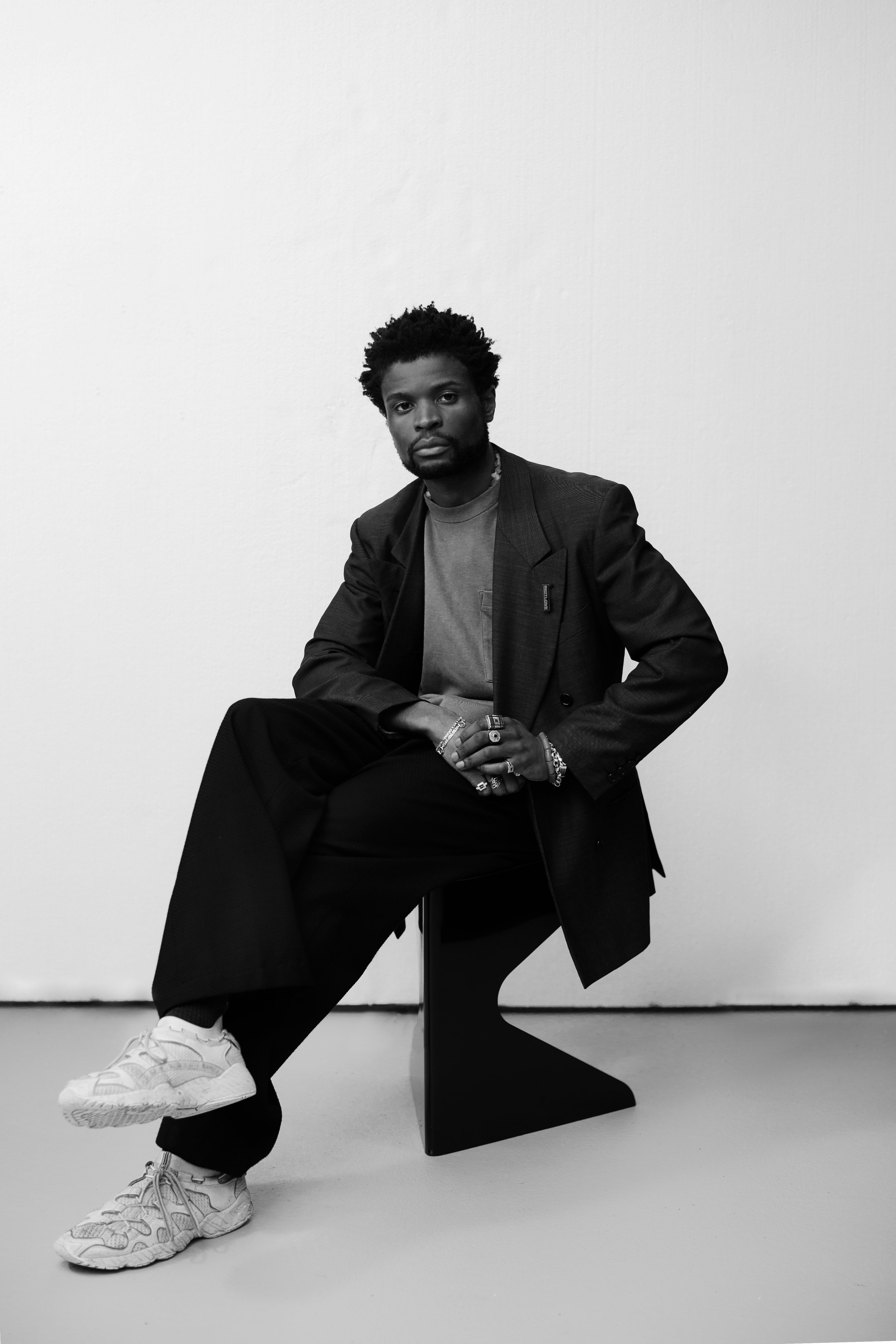
Abaga Velli, which stands for “Art Brings Access, Grants Ascendance,” was co-founded by Adémidé Udoma and Diallo Nehimiah Hasmat-Ali in 2019 as a made-to-order service but debuted their first full R-T-W collection in June 2022.
The London-based brand — which has a utilitarian and modular aesthetic — centres on community, culture and displacement. Hasmat-Ali is an entrepreneur and a musician while Udoma honed his craft by training on Savile Row.
Udoma has dressed celebrities such as John Boyega, Burna Boy, Brent Faiyaz, Christine and the Queens, and Skepta.
What inspired you to launch your label?
Adémidé Udoma: I see fashion as a powerful medium, similar to music and other disciplines. All in all, it’s a way of expression and visual communication; it can bring people together and give them a sense of identity and belief. The aim is always to provoke intrigue, feeling and eventual discernment. We want to ensure our community and customer can learn to be more conscious consumers of design by being transparent with our research, design and production.
What is the brand ethos?
Future vintage. Every item we make is made to last a lifetime, an heirloom to be passed down. I believe attention to quality allows for true longevity rather than relying on temporary trends and hype.
How would you describe your signature aesthetic?
Street Elegance. A way of dressing that allows navigating tomorrow’s landscape seamlessly. The ability to wear the same outfit in any venue and feel like yourself. Working in the luxury industry from a young age, I often felt imposter syndrome. However, I grew the confidence to express myself honestly through style and creativity. This is a freedom I want the clothes to inspire. Tailoring, which is as casual as formal, shapes that are easy to wear yet still feel unique and characterful. From the fall of the trouser to the drop of the shoulders, everything has been considered to convey this.
What was the inspiration this season?
The first collection, ‘COUP 001’, is about cementing a foundation. These shapes, fabrications and finishing will become house signatures moving forward. The larger story I aim to tell through these collections is self-development through understanding where you came from and understanding the beauty within arduous journeys. Everything for this collection is made in London, courtesy of diaspora. My team are primarily people of diaspora; therefore, through many cultures, many miles have been travelled to make these clothes; generational growth is the message.
Who is your customer?
We are always open to new audiences and customer demographics. So far, the early appreciators have been creative professionals such as designers, musicians and architects who are looking to elevate their wardrobe but still want to feel youthful and innovative in their dressing.
What are your plans for the label?
The aim is to grow into a house for creative ideation. Launching our own international gallery spaces, culinary pop-ups and cultural events across the zeitgeist.
Join our commenting forum
Join thought-provoking conversations, follow other Independent readers and see their replies
Comments